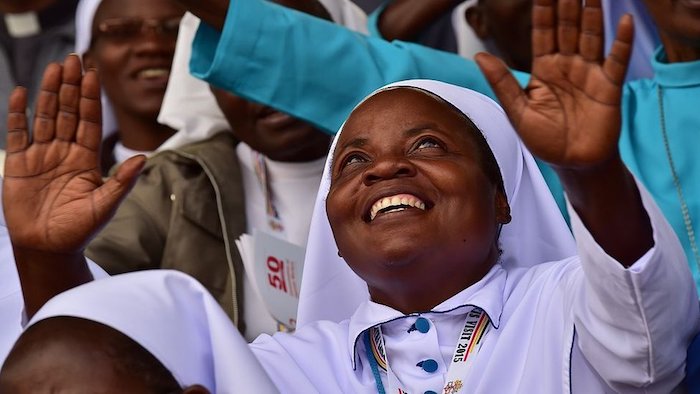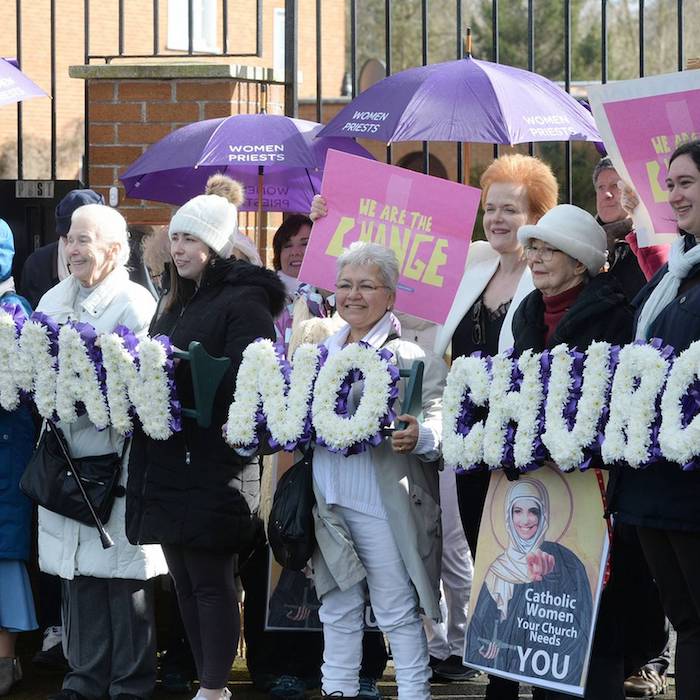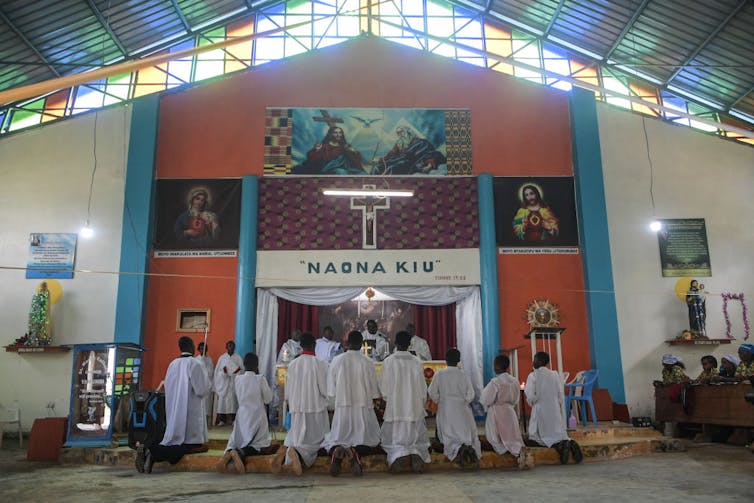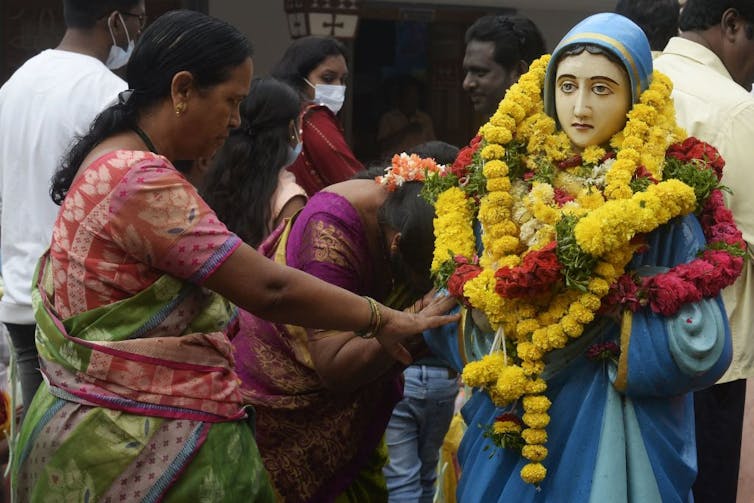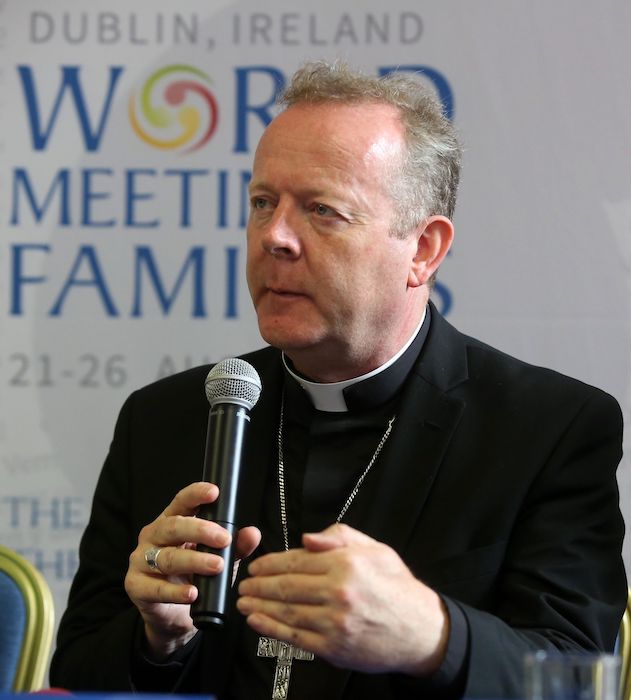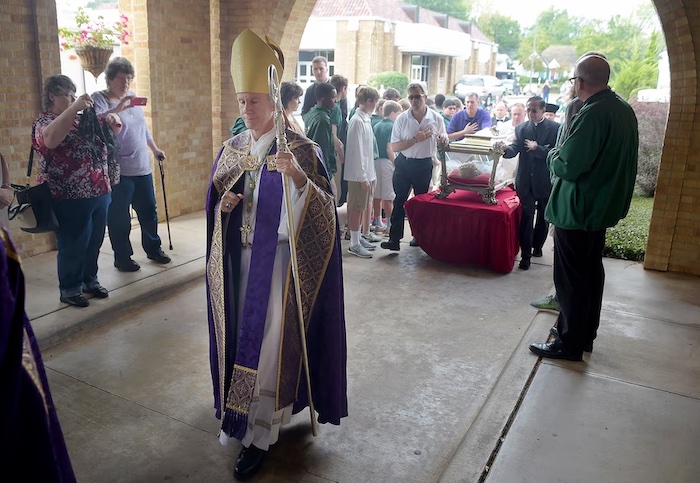
Conservative Catholics in the United States — home to perhaps the wealthiest and loudest concentration of Pope Francis’s right-wing critics — are watching the major Vatican meeting opening this week with dread and deep mistrust. Concrete organizing against the “Synod on Synodality” or against Francis is rare, but lobbing of the word “schism” is not.
From the most radical traditionalist to the mainstream conservative, many U.S. Catholics are wary about the opening Wednesday of the synod, which has been planned for more than two years. Despite worldwide listening sessions offered at every level of the Catholic Church, many conservatives feel that the long process of gathering opinions and representatives for the synod was stacked against them.
They see the free-flowing synod structure, which involves laypeople and women in equal roles to clergy, as un-Catholic, and they see as dangerous program documents such as those asking for “concrete steps” to better welcome LGBTQ Catholics and people in polygamous marriages. They feel that Jesus’ name was downplayed in synod documents.
“The primary concern is that the pope will authorize things that are not contained in Catholic doctrine or that will contradict it such as women deacons, blessing gay unions” or weakening Catholic teachings against contraception and abortion by emphasizing individual conscience, said the Rev. Gerald Murray, a New York City priest who will be in Rome during the synod doing commentary for several conservative media outlets. “We’re not Protestants.”
Such anxieties may have grown Monday with the Vatican’s release of a letter from Francis suggesting an openness to Catholic blessings for same-sex couples — so long as the ceremonies were not confused with sacramental marriages — and to further study the idea of women’s ordination to the priesthood.
Francis was responding to a letter from five conservative retired cardinals, asking him to reaffirm traditional teachings ahead of the three-week synod. The five asked him to reaffirm that sex outside marriage between man and woman is a grave sin, and to answer whether the synod will have powers that have been understood to belong only to the pope and bishops.
In addition to the involvement of women and laypeople, the synod is different from similar past events in how it has been organized. Instead of being divided into language groups, the makeup of conversation groups will be regularly changed through the weeks. Supporters of this approach see a chance to expand perspectives; conservatives see something more like speed-dating or the chaos of a preschool classroom.
“Why has it gone from a synod of bishops to include others? Bishops have a divine role in the governance of the church. Bishops’ powers are priestly power, governance power, teaching power. It’s by virtue of that power that they have the authority to tell us what to do, what to believe, tell us how to act. Laypeople can give opinions but don’t have an authoritative voice,” Murray said. “It changes the nature of the church.”
Alejandro Bermudez, a longtime journalist covering the Catholic Church in English and Spanish, said conservatives fear “that the whole thing is a bait and switch,” he said. “The synod is on ‘synodality,’ meaning discussion, is supposed to be how the church can function better, how to govern the church. But the questions are related to gay blessings, women priests, married priests. How is that related to synodality?”
Conservatives have also been offended by Francis’s at times scolding his U.S. critics. Last month, the Catholic publication La Civilta Cattolicà quoted him as saying there is a “strong reactionary attitude” among American Catholics. He characterized them as backward-looking, closed.
>“Instead of living by doctrine, by the true doctrine that always develops and bears fruit, they live by ideologies,” Francis was quoted as saying.
Conservatives are conservative by nature, and the prevailing mood could be described by those who are paying attention as an angry wait-and-see. Several close watchers of the ideological span of this group say the vast majority in it are unaware of the synod or are indifferent to it. They are said to be consoling themselves with the knowledge that Francis’s liberalizing talk has not yet resulted in change to doctrine and are looking ahead to the next conclave — the selection of a pope — where they hope Francis’s ethos will be stamped out.
“We’re leading to the next conclave. When Pope Francis dies or resigns, it’ll be a clear choice,” Murray said. “That’s the unstated thing in where this struggle is leading. If there are major changes [at the synod] and they elect someone like Francis [at the next conclave], then there will be a split. But not before that.”
Use of the word “split” or “schism” is not uncommon when the U.S. Catholic right wing is asked what the stakes of the coming years are. What exactly that would look like, however, isn’t clear. It is not new for Catholics to have sprawling disagreements, but recent years have seen more overt challenges to the church’s hierarchy.
Archbishop Víctor Manuel Fernández, an Argentine who is the Vatican’s new chief of doctrine, said in an interview last month that bishops on the right and the left who think “they have a special gift of the Holy Spirit to judge the doctrine of the Holy Father, we will enter into a vicious circle and that would be heresy and result in schism.”
The activism for now among conservative U.S. Catholics is primarily talk online, on huge media channels like EWTN and on popular blogs or YouTube channels including “First Things” and “Return to Tradition,” whose tagline is, in part, “Dealing with Modernism, Vatican 2, and all the rest of the mess that is the present state of the Church.”
“There is no unified action of movement that people will take or follow. A lot depends on the next conclave, which people shouldn’t try to predict the outcome of ahead of time,” Anthony Stine, who runs Return to Tradition, which has about 150,000 followers, wrote to The Washington Post.
“Catholics all want the same Catholic faith as their ancestors,” Stine said. “They don’t want the tough moral teachings of the Church changed to reflect the whims of a secular culture that is increasingly hostile to the faith and increasingly unstable.”
Stine has said in interviews that he doubts the synod will lead to changes such as a full embrace of homosexuality or female deacons. He said his main concern is that it may produce a document that is vague, allowing breakaway liberals to implement changes.
“So, the circus won’t be over,” he told the Catholic YouTuber Joe McClane this summer.
But some are not waiting.
Conservative activists and experts on the Catholic Church say some people are lobbying and advocating to like-minded U.S. clerics who are going to the synod. They include Winona-Rochester Bishop Robert Barron, the founder of the mega-ministry Word on Fire, whose recent chat with the right-wing activist and writer Chris Rufo drew 46,000 views; Archbishop Timothy Broglio, the president of the U.S. Conference of Catholic Bishops; and Cardinal Timothy Dolan of New York.
Stine says some Catholics are preparing to have “independent” traditional priests offer Mass in homes and businesses on Sunday mornings, as happened in the years after Vatican II.
Since Francis took office, there have been other signs of fed-up conservatives taking matters into their own hands — if not breaking away, then taking unprecedented steps.
In 2018, a group of laypeople aimed to raise $1 million and hire dozens of workers to create dossiers on every cardinal, reportedly in an effort to influence the next conclave. This year, The Post reported that a group of wealthy conservatives in Colorado had poured millions into buying mobile app tracking data that identified priests who used gay dating and hookup apps and then shared the data with bishops around the country — feeling that church leaders were not doing enough about the issue of gay priests.
Some high-profile conservative priests have sharpened the rhetoric ahead of the synod. They include the Rev. Joseph Strickland of Tyler, Tex., who in recent weeks tweeted that he “rejects” Francis’s program and that Catholics should “follow Jesus.” In a letter to his diocese, he said people who propose changes to “that which cannot be changed … are indeed the true schismatics.”
Strickland has become a hero to many conservative Catholics.
Last week, a further-right critic, the Rev. James Altman of La Crosse, Wis., posted a video calling for Francis to be killed. Altman’s bishop barred him from saying Mass in 2021 after he criticized coronavirus vaccines and said that victims of lynchings were criminals and that Catholics cannot vote Democratic. Some conservatives took to social media in recent days to ostracize Altman, but others have cheered him on. Altman also drew attention in September with a video saying Francis is not a legitimate pope.
Stine said the reactions to Altman’s declarations show that conservative Catholics “are as fractured as anything else in society.”
“Every traditional Catholic I know, as well as more mainline conservative Catholics who oppose [Francis’s] program for the Church, all pray for him daily. That’s the biggest mark of support you can offer to anyone, honestly,” Stine wrote to The Post. That said, most traditional Catholics with whom he speaks “think we’re in a state of de-facto schism and have been for a long time now,” he said. “If anything, the state of the Church will be made more obvious at the end of the synodal process.”
Complete Article ↪HERE↩!

